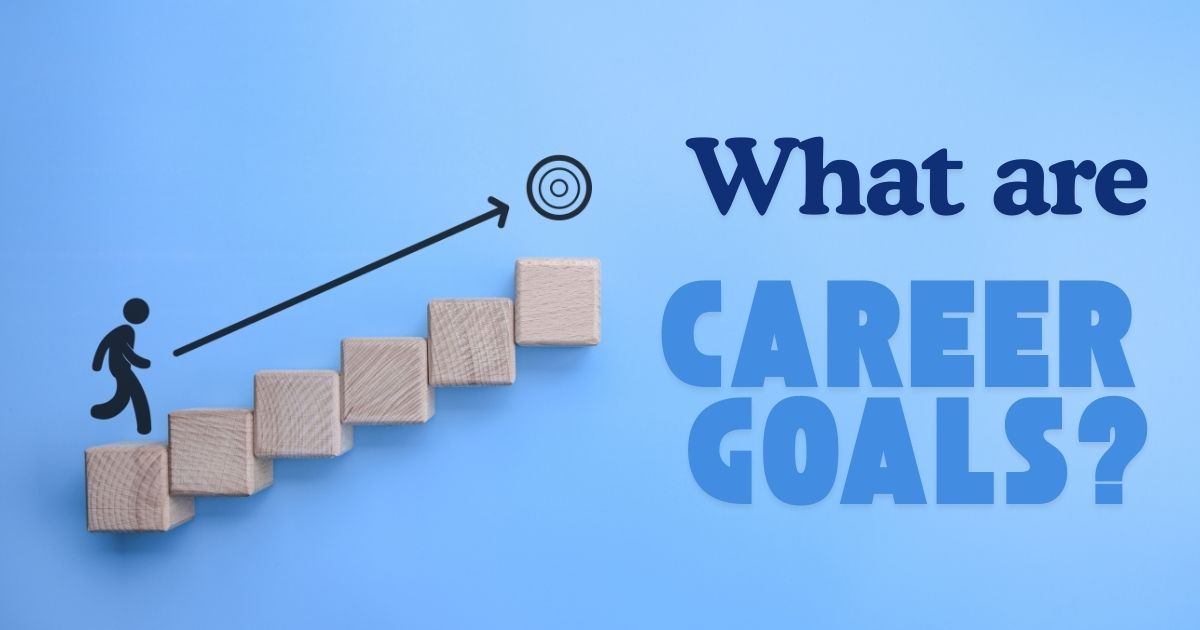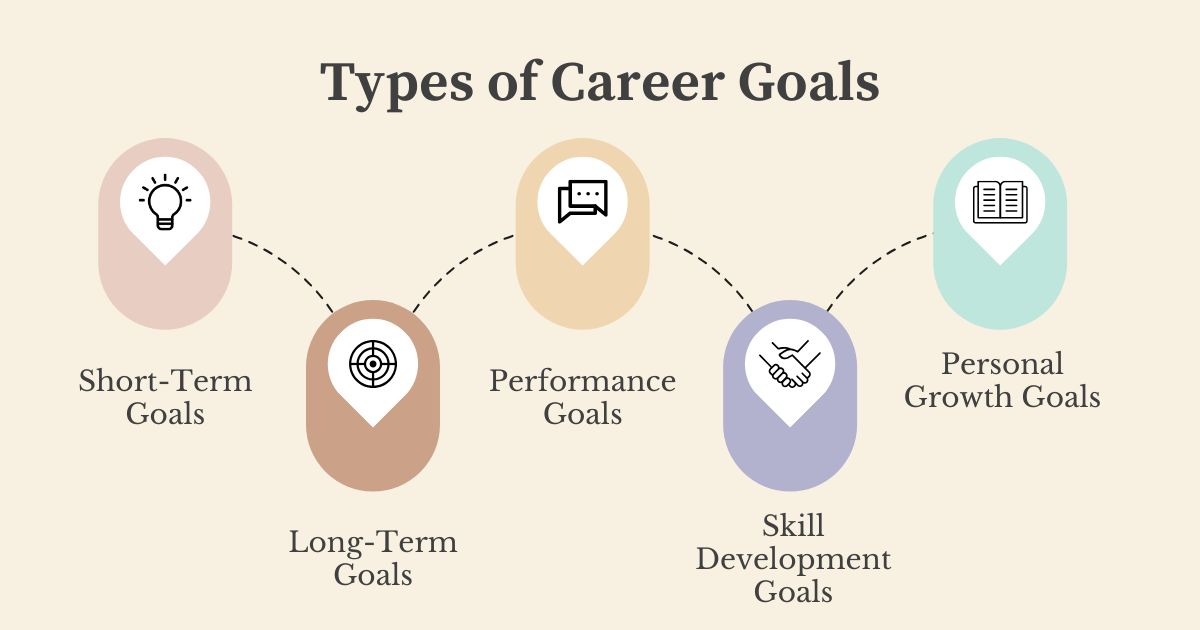What Are Career Goals? Types, Examples & Advice
In any aspect of life, setting goals is the key to success. The same is true in work. Only when you have goals and career orientation can you start planning and taking action to achieve what you want. What are career goals? Why do you need to have them? Now is the time for you to find the answer with Skilltrans.
What are Career Goals?

Career goals are the milestones that you hope to achieve in your career. Whether you are a job applicant, an employee, or even a director or CEO of a company, you must clearly define your career goals because it helps you come up with effective action plans.
Setting unrealistic career goals can make you feel disappointed. But that doesn't mean you shouldn't set goals. Creating career goals is the easiest way to motivate yourself to achieve your dreams.
When setting career goals, you need to consider where you are now, where you want to be, and what you need to do to get from A to B.
If you don’t have career goals yet, think about your current employment situation. Where do you see yourself in 5 years? Who do you want to be in life? How much money do you want to have in your bank account in 2 years? What will you do when you retire? Etc. Congratulations, you’ve achieved some goals! Setting career goals is simple, right?
Why Do You Need Career Goals?

For many people, a job is literally just a job. They go to the office and work for 8 hours, repeating the same thing day in and day out. Life is boring, right? That's why you need career goals. At first glance, career goals may seem like an unnecessary formality. But after understanding the importance of career goals that we are about to introduce, you will have a different perspective:
Career Goals force you to ask yourself difficult questions
If before you only asked yourself simple questions like should you do this or that first? What do you eat for lunch? Where do you put your documents? Do you have time to drink coffee before you go to work?
You’re asking yourself a lot of questions, but none of them really matter. When was the last time you asked yourself:
What does your career look like in 5 years?
What do you need to do to get to your dream job?
What’s your biggest accomplishment in your career?
What project have you been most frustrated with?
These are the questions you need to answer when setting career goals, and they’ll ensure you don’t get caught up in the day-to-day minutiae.
Give you career direction
Have you ever felt lost in your career? Like you’re just trying to get through each day and expect to get paid at the end of the month?
Setting career goals is important because it gives you a framework to reach important career milestones. You feel more inspired to work when you have a clear idea of what you are aiming for.
Once you know what you want to achieve in your career and what you need to do to get there, you will not waste time on unnecessary or low-value tasks during your working hours. You will begin to appreciate the value of time - how much you have and how much you need to achieve your goals.
Increase your accountability for your actions
When you write down your career goals on your CV or tell others about your goals, you will have a greater sense of accountability. An easy-to-understand example is the position of sales staff in a retail company, they are familiar with sales targets. Sales staff are responsible for those targets and always have to try to achieve monthly sales targets.
A study shows that people who can vividly visualize or describe their goals in detail are 1.2 to 1.4 times more likely to achieve their goals than others.
How do you Answer What Your Career Goals are?

When going for a job interview, "What is your career goal?" is a question that 99% of employers love. After understanding what your career goal is, the next important thing is that you must know how to set career goals so that you can create an effective action plan. Obviously, in a job interview, you have career goals, but you also need to know how to effectively communicate them to the employer.
First, you need to have a clear and concise description of your career goals in your resume. This description needs to be expressed in a way that the employer can understand and is suitable for the company you are applying to. Next, be prepared to explain how you plan to achieve your career goals. After you have clearly stated your career goals, the employer will continue to dig deeper to learn about your abilities and vision.
Types of Career Goals

Career goals can be categorized into different types based on their focus and timeframe. Understanding these types can help you set well-rounded objectives that cover various aspects of your professional development.
Short-Term Goals
Every success starts with the first small step. So to get to a successful career path, you need to make short-term goals. Short-term goals are actionable objectives that you can achieve within a relatively short timeframe, typically ranging from a few weeks to a year. These goals are essential stepping stones that help you make progress toward larger, long-term career aspirations.
Short-term goals are often specific, measurable, and focused on immediate tasks or improvements. For example, they might include completing a professional certification, improving a particular skill, networking with industry professionals, or preparing for a job interview.
These goals offer quick wins that build confidence, provide motivation, and keep you on track toward your broader career vision.
Long-Term Goals
Long-term goals are overarching career aspirations that take several years to achieve. These goals are significant milestones that define the trajectory of your professional life, such as becoming an industry expert, attaining a leadership position, starting your own business, or transitioning to a new career field.
Unlike short-term goals, long-term goals require consistent planning, dedication, and adaptability. You need to break them down into smaller, actionable steps, such as acquiring advanced qualifications, gaining relevant work experience, or developing specific skills.
Long-term goals provide direction and purpose. It makes your daily efforts align with your broader vision. Based on long-term goals, you create a roadmap for your career, enabling you to make decisions that support sustainable growth and long-term fulfillment.
Performance Goals
Performance goals are often linked to your job responsibilities, project deliverables, or organizational targets. They have a mission to evaluate your efficiency and effectiveness in your role.
Performance goals are typically short- to medium-term and can be aligned with key performance indicators (KPIs) set by your employer.
Skill Development Goals
Skill development goals are acquiring new technical skills, improving soft skills, or mastering industry-specific tools and technologies.
Setting skill development goals not only prepares you for future opportunities but also helps you excel in your current role. They align personal growth with professional success, making you a valuable asset in your field.
Personal Growth Goals
Personal growth goals develop qualities and habits that enhance your overall well-being and effectiveness, both professionally and personally. These goals aim to foster self-improvement, build resilience, and support a balanced approach to career success.
These goals are often ongoing and evolve as you gain experience and face new challenges in your career.
Career Goal Examples
Setting clear career goals can help you stay focused and motivated on your professional journey. Here are examples of career goals across various categories to inspire you:
Short-Term Goals
Complete a professional certification within six months.
Improve public speaking skills by joining a local Toastmasters group.
Network with at least five industry professionals in the next quarter.
Master a specific software or tool required for your job.
Long-Term Goals
Attain a senior management or executive-level position within 10 years.
Start your own business in your chosen industry.
Earn an advanced degree, such as an MBA or a PhD.
Become a thought leader by publishing articles or speaking at industry conferences.
Performance Goals
Increase sales by 15% over the next fiscal year.
Complete a major project ahead of schedule and under budget.
Improve customer satisfaction scores by 10% within the next six months.
Reduce operational inefficiencies in your team by implementing new processes.
Skill Development Goals
Learn a new programming language, such as Python, in the next three months.
Develop leadership skills by taking a management training course.
Become fluent in a foreign language relevant to your industry.
Gain expertise in data analysis or visualization tools like Excel or Tableau.
Personal Growth Goals
Achieve better work-life balance by setting boundaries and prioritizing self-care.
Build resilience by practicing mindfulness and stress management techniques.
Improve time management skills to boost productivity and meet deadlines consistently.
Strengthen emotional intelligence to foster better workplace relationships.
Skilltrans would like to introduce some career courses that may be useful to you. Please click on the course name below to learn more
Unlock Your Future: Ace Residency or Fellowship Interview!
The Residency and Fellowship Interviews course is a comprehensive resource that can help students prepare for success in their residency and fellowship interviews. The course covers a wide range of topics, including:
Common interview questions: Students will learn about the most common interview questions that are asked in residency and fellowship interviews, and how to develop strong answers to each question.
Experience questions: Students will learn how to answer experience questions in a way that highlights their skills, knowledge, and values.
Behavioral and situational questions: Students will learn how to answer behavioral and situational questions in a way that demonstrates their critical thinking skills, problem-solving skills, and ability to work well under pressure.
Personality questions: Students will learn how to answer personality questions in a way that is authentic and genuine.
Medicine questions: Students will learn how to answer medicine questions in a way that demonstrates their knowledge of the specialty and their commitment to lifelong learning.
Upwork Mastery: Step by Step Guide to Grow Freelance Earning
This course has been meticulously crafted by freelancer, for freelancers.
Are you ready to kickstart your freelance career and boost your earnings?
In 2022 alone, clients on Upwork paid out over $3.3 billion to freelancers. It's time to grab your slice of that lucrative pie!
Throughout this course, you'll embark on a practical journey, equipped with lessons, workbooks, and real-world applications. Plus, when you enroll, you gain exclusive access to group mastermind sessions and the thriving Upwork University Community Space.
Who's behind this course? Meet Vasilii Iuferov, an accomplished Top Rated Plus Freelancer with an impeccable 100% success rate.
Career Change - Find Your Perfect Job
Our Online Career Change School follows 5 crucial steps that will help you get over your career change fears and teach you how to make small but bold steps in an exciting new direction – even if you don't know exactly what you want to do yet.
This is a learning by doing experience that will teach you how to start getting unstuck and find new career opportunities for yourself. It’s about developing a powerful new toolkit, network and mindset to help you identify and execute exciting opportunities over the next few years as you transition into a new direction.
With step by step instructional videos, downloadable resources and relevant case studies this course can lead you to your perfect career.
Conclusion
Well-defined career goals motivate you to overcome challenges and seize opportunities for growth. Don't hesitate to turn your aspirations into reality and achieve the professional success you desire.
Do you want to achieve your career goals through learning and practice? If the answer is yes, sign up for Skilltrans courses today.

Meet Hoang Duyen, an experienced SEO Specialist with a proven track record in driving organic growth and boosting online visibility. She has honed her skills in keyword research, on-page optimization, and technical SEO. Her expertise lies in crafting data-driven strategies that not only improve search engine rankings but also deliver tangible results for businesses.



